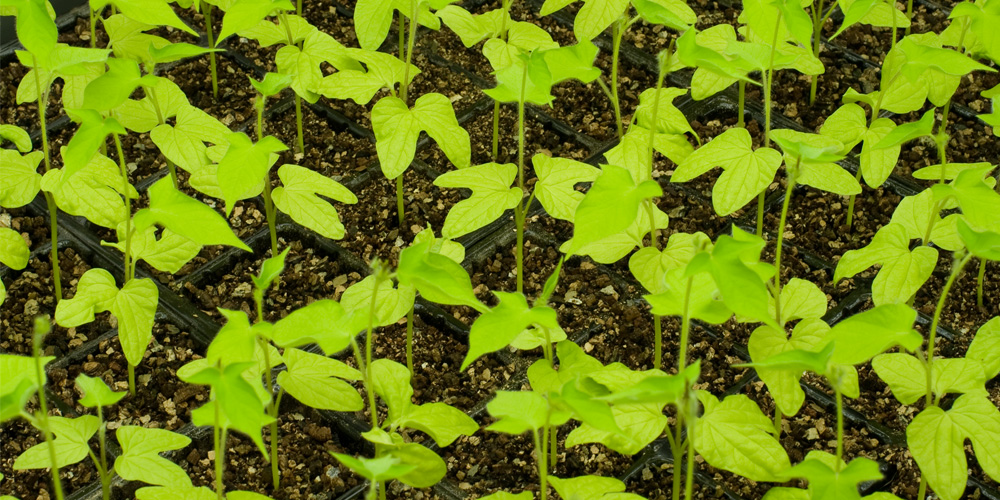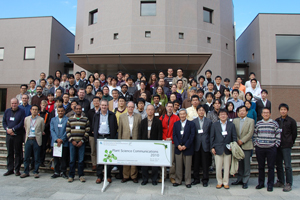
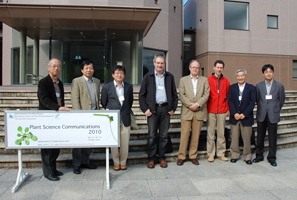
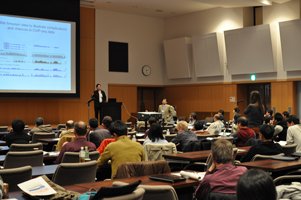
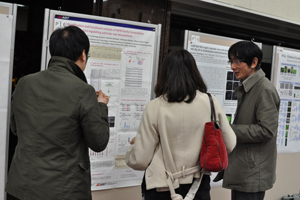
基礎生物学研究所は植物科学分野での学術交流と研究推進を目的として、第2回目となるNIBB-MPIPZ合同シンポジウム“Plant Science Communications 2010”を2010年11月16日(火)~ 18日(木)、愛知県岡崎市・岡崎コンファレンスセンターにて開催した。この合同シンポジウムは2009 年に基礎生物学研究所と学術協定を結んだマックス・プランク植物育種学研究所(MPIPZ)とその年の8月にドイツのケルン市で開催したのが始まりであり、今回新たに学術協定を結んだシンガポールのテマセック生命科学研究所(TLL)、さらには文科省科研費特定領域研究「植物メリステムと器官の発生を支える情報統御系(代表:町田泰則)」からも講演者を迎え、植物科学分野の最新の成果を報告するとともに、相互の交流を深めた。トピックは、発生、細胞内輸送、自然変異、エピジェネティクス、光合成、植物微生物相互作用など多岐にわたったが、いずれの分野も次世代シーケンサーを用いた大規模ゲノム解析やイメージング解析が精力的に行われており印象的であった。また、西村幹夫教授とMPIPZ のPaul Schülze-Lefert 博士による基調講演に加え、基礎生物学研究所に着任したばかりの皆川純教授による光合成の電子サイクルを駆動する超分子複合体の研究、松林嘉克教授による根端メリステムを維持する新規ペプチドの発見など最新のトピックが発表された。
ポスター発表では、主として若手研究者による47件の発表があり、セッションの終わりまで熱心に議論する姿が見られた。また、基礎生物学研究所の施設見学や研究室への参加者の個別訪問などのスケジュールを組み入れることによって、相互の国際交流を深めた。
シンポジウムのプログラム作成や運営においては基礎生物学研究所の植物系の助教と広報国際連携室が大いに貢献したことも付記しておきたい。(川口 正代司)
Based on agreements on international academic collaboration with the Max-Planck Institute for Plant Breeding Research (MPIPZ, Germany) and the Temasek Life Sciences Laboratory (TLL, Singapore) formalized in 2009 and 2010, respectively, the 2nd international joint symposium titled “Plant Science Communications 2010” was held from the 16th through 18th of November 2010 at the Okazaki Conference Center. It included 11 speakers, mainly Principal Investigators (PIs), from MPIPZ and 5 PIs from TLL plant science laboratories as well as 8 speakers from NIBB plant science laboratories. In addition, 6 select researchers from JSPS Machida Plant Meristem Project joined and spoke at the symposium. The number of participants was more than a hundred.
The symposium was successfully managed by young assistant professors from plant science laboratories in NIBB. There were lively discussions of the latest results during and after the talks. The topics were focused on development, natural variation, plant-microbe interaction and epigenetics. It was impressive that large-scale analyses using next-generation sequencing technology are becoming a standard in the research done at MPIPZ. The poster session included 47 posters by young plant scientists, and active discussions until the end of the session. An NIBB Lab Tour Session was organized for the morning of the second day to provide time for discussion of future collaborations between the attendants and NIBB researchers. The representatives of the three institutes, NIBB, MPIPZ and TLL, pledged to keep supporting this symposium as a center for collaboration between plant scientists from Japan, Germany and Singapore.


